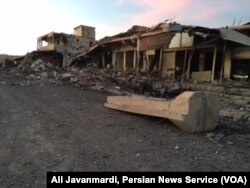The special U.S. envoy to the global coalition to counter the Islamic State group (IS/ISIL) said dozens of U.S. special operations forces will be deployed "very soon" in Syria to work with Arab forces trying to isolate the group's self-proclaimed capital and end terrorist plots.
Brett McGurk said on U.S. television Sunday these anti-IS forces in recent weeks already have retaken territory and killed hundreds of IS fighters.
McGurk said he would not disclose the date, due to the sensitive nature of the U.S. deployment, but added that fewer than 50 special operations troops would enter northern Syria "very soon." Their mission, announced late last month, is aimed at providing anti-IS Arab forces training, advice and assistance.
These anti-IS forces already have conducted a "very successful operation," McGurk said. "They’ve taken about 1,100-square kilometers in just the last two weeks. They’ve killed about 300 ISIL fighters, and this is focused on isolating the capital of ISIL in Raqqa, where we think a lot of these [terrorist] plots are being hatched."
McGurk said the goal is to take back territory, kill IS leaders, and cut off their financing as well as the global networks feeding foreign fighters into IS ranks. He pointed to Friday's U.N. Security Council resolution calling IS attacks in Tunisia, Turkey, Beirut, Paris and the downing of a Russian plane over Sinai a "global and unprecedented threat to international peace and security."
Administration's plan critiqued
Before departing Malaysia following an East Asia summit, President Barack Obama on Sunday vowed the U.S.-led coalition will destroy the IS group.
"We are intensifying our strategy on all fronts with local partners on the ground. We are going to keep on rolling back ISIL in Iraq and in Syria and take more of their leaders and commanders so that they do not threaten us, and we will destroy this terrorist organization," said Obama.
But Senator Diane Feinstein, the senior Democratic member of the Intelligence Committee, appeared separately on CBS' "Face the Nation" Sunday and said she thinks the Obama administration's approach is insufficient.
"I’m concerned that we don't have the time and we don't have years. We need to be aggressive now because ISIL is a quasi-state. ISIL has 30,000 fighters, it’s got a civil infrastructure, it's got funding, it’s spreading in other countries, and it’s a big, big problem," Feinstein said. "And, now what you see, I think, in other places is a competition developing from other terrorist organizations, but ISIL is something apart. It’s enormously strong and it has to be dealt with in a very strong manner."
Feinstein suggested a larger U.S. special operations presence in northern Syria may be required: "There may be some land held by ISIL in Iraq and Syria that's been taken back. But for all of that, there's much more they have gained in other countries."
McGurk says efforts ramping up
Envoy McGurk insisted the U.S.-led coalition is not being slow in its pledge to destroy the militant organization.
"We’ve had to do some things over the last year to set the conditions for us to accelerate our efforts," he said. "Just over the last two weeks, we've had simultaneous operations in Syria and Iraq with Kurdish and Arab forces to cut off this main supply route that ISIL has had between Raqqa and Mosul [Iraq]. Those are very successful operations.
"Our special forces going into northern Syria," he continued. "Their mission will be to organize those forces on the ground, a broad coalition of forces to push down on Raqqa. We couldn’t have done that six months ago."
He said the strategy is to strangle the Islamic State at its core in Iraq and Syria by blocking its corridor into Turkey, cutting access points between Raqqa and Mosul, holding the northern flank above the Tigris River and working with Iraqi security forces to retake the provincial Anbar capital of Ramadi. He said the United States also plans to increase international cooperation to disrupt the global networks supplying foreign fighters to the IS group.






